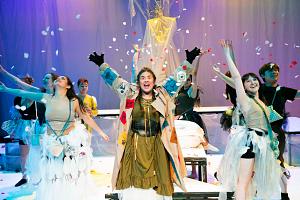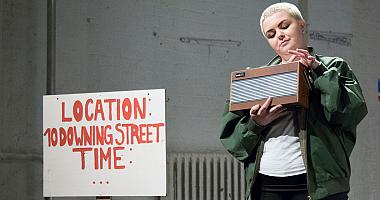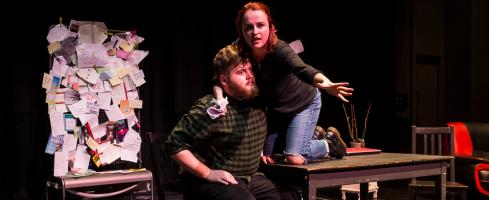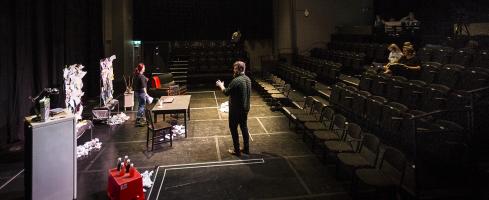BA (Hons)
Drama & Theatre Arts
The BA Drama and Theatre Arts is designed to foster creative, radical theatre-makers and thinkers. It is adventurous in form, international in scope and hands-on in practice.
Content navigation menu
Why study BA Drama & Theatre Arts at Goldsmiths
- The BA Drama and Theatre Arts is a radical and innovative degree. We prepare theatre-makers who are socially, culturally, and politically engaged.
- Tutored by our diverse and talented team, you will develop practical skills in acting, directing, dramaturgy, scenography and production management. Bringing these skills together, you will learn how to collaborate and operate in companies, ready to take your own show on the road.
- A balanced integration of theory and practice supports you to become the complete theatre maker. Knowledge gained through making and doing adds to your conceptual understanding, while the insights gained in writing about theatre and society inform the choices you make in your practice-based work.
- The degree explores what it means to perform in contemporary culture, mobilising a range of theatre and performance practices from the interpretation of play texts to devised ensemble work and the possibilities opened up by political protest, live art, and the avant-garde.
- The curriculum is responsive to the global reach of our teaching staff, including expertise in African, American, Francophone, Japanese, and South Asian performance, as well as British, European, and Russian theatre traditions.
- You will be introduced to a wide range of theatre thinkers, and explore the history and cultural diversity of performance. You will develop a complex understanding of what it means to make theatre in an increasingly global and digitised 21st-century society. And with London’s rich theatre culture on your doorstep, you can draw on an exciting range of contemporary practice to inform your thinking and making.
- Students on this programme typically develop into bold and versatile creatives. They are practically adept and imaginative, critically agile, able to form companies and to manage the business of production. Our bespoke Personal and Professional Development Package events series combines career support with taught elements, and enrichment opportunities and introduces you to our dynamic alumni network.
Contact the department
If you have specific questions about the degree, contact Alexa Reid.
UCAS code
W440
Entry requirements
A-level: BBB
BTEC: DDM
IB: 33 points overall with three HL subjects at 655
Length
3 years full-time, 6 years part-time
Fees
Home - full-time: £9250
International - full-time: £20160
Department
Watch videos about this course
What you'll study
You will begin your degree by developing a range of practical, dramaturgical, and critical abilities.
In your first year you learn technical and design skills, begin ensemble work and start to think about what it means to perform and make theatre in today’s world. These skills are brought together in a festival of work in the summer term.
You'll take the following compulsory modules:
| Module title | Credits |
|---|---|
| Critical Dialogues A | 15 credits |
| Critical Dialogues B | 15 credits |
| Introduction to Dramaturgy | 15 credits |
| Scenography | 15 credits |
| Theatre Making 1 | 30 credits |
| Processes of Performance: Encounters with Space | 15 credits |
| The Ensemble | 15 credits |
Note about optional modules (if available): The above is indicative of the typical modules offered, but is not intended to be construed or relied on as a definitive list of what might be available in any given year. The module content and availability is subject to change.
Teaching style
This programme is taught through scheduled learning - a mixture of lectures, seminars and workshops. You'll also carry out performance and production work, and will attend lab sessions.
You’ll be expected to undertake a significant amount of independent study. This includes carrying out required and additional reading, preparing topics for discussion, and producing essays or project work.
The programme is a blend of learning between 50% practical and 50% theoretical.
How you'll be assessed
You will be assessed by a range of methods depending on your module choices. These include coursework assignments such as essays, portfolios, research statements and exams, as well as practical assignments such as practice-based presentations and oral presentations, and in your third year, an Independent Research Project and participation in a public performance festival.
What our students say

Entry requirements
We accept the following qualifications:
A-level: BBB
BTEC: DDM
International Baccalaureate: 33 points overall with Three HL subjects at 655
Access: Pass with 45 Level 3 credits including 30 Distinctions and a number of merits/passes in subject-specific modules
Scottish qualifications: BBBBC (Higher) or BBC (Advanced Higher)
European Baccalaureate: 75%
Irish Leaving Certificate: H2 H2 H2 H2
If you can't find your qualification here, then please visit our entry requirements page for a list of alternative qualifications.
Additional requirements
You must be able to express a well-informed interest in theatre and performance theory and practice.
While drama and theatre studies would be an advantage, this is not necessarily essential as we are also interested in those with other subjects or complementary experience. Applicants with A-levels in an arts and humanities subject such as English, history, languages, philosophy and sociology are welcomed.
.
International qualifications
We also accept a wide range of international qualifications. Find out more about the qualifications we accept from around the world.
If English isn’t your first language, you will need an IELTS score (or equivalent English language qualification) of 7.0 with a 7.0 in writing and no element lower than 6.5 to study this programme. If you need assistance with your English language, we offer a range of courses that can help prepare you for degree-level study.
Alternative qualifications
See our full list of undergraduate entry qualifications.
We welcome students with a range of educational experiences. If you believe you may not meet the standard qualification requirements we would still encourage you to apply because we consider all aspects of your application when making a decision.
We’ll pay particularly careful attention to your personal statement, which is your opportunity to demonstrate your interest in the subject you’ve applied for. Your referees are also welcome to include any relevant contextual comments around your academic achievements. We’ll look at all these things when making a decision on your application, as well as your qualifications and grades.
Fees and funding
Annual tuition fees
These are the UG fees for students starting their programme in the 2024/2025 academic year.
From August 2021 EU/EEA/Swiss nationals will no longer be eligible for 'Home' fee status. EU/EEA/Swiss nationals will be classified as 'International' for fee purposes, more information can be found on our fees page.
- Home - full-time: £9250
- International - full-time: £20160
If your fees are not listed here, please check our undergraduate fees guidance or contact the Fees Office, who can also advise you about how to pay your fees.
It’s not currently possible for international students to study part-time if you require a Student Visa, however this is currently being reviewed and will be confirmed in the new year. Please read our visa guidance in the interim for more information. If you think you might be eligible to study part-time while being on another visa type, please contact our Admissions Team for more information.
If you are looking to pay your fees please see our guide to making a payment.
Funding opportunities
We offer a wide range of scholarships and bursaries, and our Careers Service can also offer advice on finding work during your studies. Find out more about funding your studies with us.
Additional costs
In addition to your tuition fees, you'll be responsible for any additional costs associated with your course, such as buying stationery and paying for photocopying. You can find out more about what you need to budget for on our study costs page.
There may also be specific additional costs associated with your programme. This can include things like paying for field trips or specialist materials for your assignments. Please check the programme specification for more information.
Careers
Our students have gone on to work as in many areas, including:
- Performers, directors, choreographers, movement directors, casting directors
- Writers, editors, and dramaturgs
- Producers in theatre, film, radio, digital arts, visual arts, and community practice
- Play, screen and radio writers, and journalists
- Community arts practitioners
- Lighting, sound, set, and costume designers
- Stage and production managers
- Venue and event managers
- Marketing and promotion specialists
- Teachers, workshop leaders and facilitators, lecturers, and academics
You will become part of this community if you join the degree – our graduates often return to pass on their professional wisdom to the next generation of theatrical innovators.
You can find out more about the career options open to you following graduation on our Theatre and Performance careers page.
Find out more about employability at Goldsmiths.
Onwards and upwards
Our graduates emerge with a complete range of skills, equipped to challenge contemporary theatre and to put new ideas into effect. Some of our graduate successses include:
- Rebecca Frecknall won the Olivier Award for Cabaret. Worked as Resident Director at the National Theatre Studio and then Sir Richard Eyre's AD.
- Dennis Kelly is a Tony Award-winning writer and producer. Dennis wrote the book for Matilda the Musical. Other writing credits include the BBC (Pulling), Channel 4 (Utopia) and HBO (The Third Day, with Punchdrunk). His plays have been performed at the National Theatre, Royal Court, Hampstead Theatre, BAC, Young Vic, etc.
- Mojisola Adebayo - performer, writer, director, producer and academic sharing work around the world, from Antarctica to Zimbabwe. She has acted in over 50 theatre, television and radio productions, and devised and directed over 30 scripts for stage and video.
- Liv Ello and Frankie Thompson have put their skills into practice with their highly acclaimed show in the 2023 Edinburgh Fringe. Read more about this performance in their five-star review in the Guardian.
- Tatenda Shamiso, writer and performer. Their show Now I.D. was performed at the Royal Court in May 2023. They have also worked as the AD on the smash-hit Streetcar Named Desire at the Almeida in Jan/Feb 2023. Performer in Sundown Kiki at the Young Vic.
- Latifaha Ireland - Championed the Care Leavers Working Group with DCMS & specialist publisher on gov.uk. They now work with Lambeth Children’s Service, and co-founded Beloved Theatre Company.





